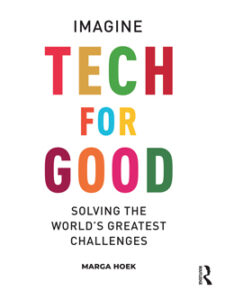 As Tech for Good becomes a wider field with broader applications, the related sustainable growth markets are being unlocked and discovered. New sustainable tech areas are popping up and growing rapidly where solutions are urgently needed. Tech areas that were not traditionally associated with sustainable objectives are now beginning to turn their focus toward Tech for Good. Although innovations have disrupted the financial sector, FinTech was originally not associated with purpose-driven business practices. Now it is becoming a global movement for change as part of the wider Tech for Good movement.
As Tech for Good becomes a wider field with broader applications, the related sustainable growth markets are being unlocked and discovered. New sustainable tech areas are popping up and growing rapidly where solutions are urgently needed. Tech areas that were not traditionally associated with sustainable objectives are now beginning to turn their focus toward Tech for Good. Although innovations have disrupted the financial sector, FinTech was originally not associated with purpose-driven business practices. Now it is becoming a global movement for change as part of the wider Tech for Good movement.
The broad spectrum of Fourth Industrial Revolution (4IR) technologies reveals the pervasive nature of tech innovation throughout business sectors. Many tech areas were identified as sustainable growth opportunities, often with disruptive benefits, like FinTech. Collaborations and joint ventures between companies with different competencies and sector knowledge are fruitful. Traditional and new tech areas are being repurposed to respond to the Tech for Good movement while seeking new growth and profit markets.
As one of the most pressing challenges, climate change will be at the forefront of boosting growth in areas like CarbonTech and ClimateTech. CarbonTech is attracting more and more interest from investors and governments lately. While concerns over global warming become stronger, the tech area has promoted and proliferated carbon capture.
Although the tech has been around for decades, it is only recently ramping up the ability to deliver on its promise. Now, a new cohort of carbon capture technologies and companies are emerging with their sights set on bridging the gap between the ongoing energy transition and the world’s reliance on heavy emitting oil and gas industries. Aker Carbon Capture, Climeworks, and LanzaTech represent just a few of the innovative companies in the CarbonTech area.
There are also examples of grand-scale, technologically advanced cities being built with these tech areas as a basis for rethinking urban planning. The Carbon Free City Neom in Saudi Arabia is one such initiative, progressively combining CarbonTech, ClimateTech, GreenTech, PropTech, and UrbanTech as an integral component of its design. The city will be a 26,500-square-km high-tech development on the Red Sea with several zones, including industrial and logistics areas, planned for completion in 2025. With no roads, cars, or emissions, it will run on 100% renewable energy and 95% of the land will be preserved for nature.
The carbon capture and sequestration industry has been attracting major investor interest, as the market is expected to grow from $2.01 billion in 2021 to $7 billion by 2028 at an estimated CAGR of 19.5%. In the UK alone, ClimateTech startups raised nearly $8 billion in 2022, which is double the entire $4 billion raised by the same firms throughout 2021. Private investment firms are focusing on active entrepreneurial value investing across tech genres and geographies. G9CM is a forward-thinking business with offices around the world that invest in opportunities for unlocking untapped potentials arising from tech innovation. Their venture capital growth strategy identifies candidates that have developed a solid business model and are ready to scale globally.
G9CM’s selected investments start with a minimum equity volume of $250,000 with a maximum of $10 million in several tech areas including EdTech, FinTech, AgriTech, CarbonTech, HealthTech, SpaceTech, and others.
Leading the Tech for Good Movement
The Tech for Good movement is gaining momentum as it is increasingly engaging stakeholders from all sectors and regions. When developing technology, businesses must take the lead to incorporate responsible practices and sound frameworks. While tech has been a major force for progress, it also has the potential to be abused and cause harm. From steam power to automobiles, history shows that technology is neither good nor bad in and of itself. It can be both beneficial and detrimental, depending on how it is used. Modern 4IR tech advancement, like that of the Internet and AI, is no different. Leadership in Tech for Good takes on different forms. Bold companies with vision and purpose are guiding us along a tech paradigm ship toward an imaginable and achievable sustainable future.
Bold business leadership is driving the Tech for Good movement. Companies that are nimble and take decisive action can quickly redirect and accelerate forward progress on the 17 SDGs. The Global Goals are a vision for the world. We all own them, together as a collective body, and therefore each of us owns the responsibility of achieving them. Let us not, however, forget that the UN’s framework is fluid and serves primarily as a roadmap to direct our journey.
The path to our destination is not linear. Forward-thinking businesses have the power to take charge, devise a plan that serves both profit and purpose, and lead the way in the Tech for Good movement.

Marga Hoek is a multi-award-winning, bestselling author of The Trillion Dollar Shift (described as “Required Reading” for CEOs by Fortune), a global thought leader, and a former three-time CEO. She has been recognized by Thinkers50 for her global management thinking and is one of the most appreciated speakers around the world on sustainable business, capital, and technology. She is also the author of Tech for Good: Imagine Solving the World’s Greatest Challenges (2023).
Adapted from Tech For Good: Imagine Solving the World’s Greatest Challenges by Marga Hoek, published with kind permission of Routledge.












